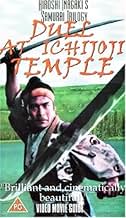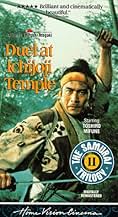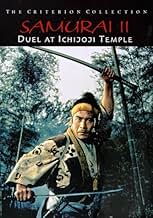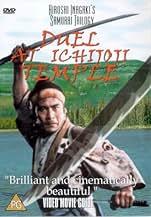NOTE IMDb
7,3/10
7,3 k
MA NOTE
Musashi, qui essaye de défier en duel le maître d'une école de samouraï, en est empêché par ses disciples. Otsu, qui attend toujours son retour, rencontre Akemi qui se languit aussi de lui. ... Tout lireMusashi, qui essaye de défier en duel le maître d'une école de samouraï, en est empêché par ses disciples. Otsu, qui attend toujours son retour, rencontre Akemi qui se languit aussi de lui. Aucune des deux ne sait qui serait la promise.Musashi, qui essaye de défier en duel le maître d'une école de samouraï, en est empêché par ses disciples. Otsu, qui attend toujours son retour, rencontre Akemi qui se languit aussi de lui. Aucune des deux ne sait qui serait la promise.
- Réalisation
- Scénario
- Casting principal
Avis à la une
Being the middle film of a trilogy, Duel at Ichijoji Temple thankfully came with a lot more battle sequences than the first film, and had more finesse in its swordplay since our legendary heroic character Takezo (Toshiro Mifune) is now a skilled swordsman, but yet to put into practice many aspects of Bushido, and often criticized in the manner in which he finishes off his opponents because of his innate brute strength and force.
But I guess when you're top dog, criticism comes part and parcel, and in his warrior pilgrimage in discovery of skill and self, we see how he further develops, though at time I felt that the story utilized a cheat sheet just like the first film, where priest Takuan (Kuroemon Onoe) locked him in a castle with plenty of books. Here, while Takezo is in hiding, he spends plenty of time indoors under the patronage of Lady Yoshino (Michiyo Kogure), a courtesan who would inculcate some compassion into the gruff man's life - while he looks refined on the outside, his ambition and reputation continue to earn him no favours, especially since he had issued a challenge to the Yoshioka School.
As a middle film, it expanded the mythology, and further developed the characters who made teasing appearances in the first one. For instance, the young man who was smitten by Akemi (Mariko Okada) turns out to be none other than the leader of the Yoshioka School, Seijuro Yoshioka (Akihiro Hirata), who in a fit of envy began to violate Akemi, taking his ineptness onto a helpless girl. Such are incidents that make the character a little revolting, and the members of his school showcased to be nothing more than mere bullies to the townsfolk, as well as constantly sucking up to Seijuro by shielding his incompetence from the real world.
The villains in this installment turn out to be more formidable than the thugs and brigands that Takezo had to deal with earlier. In fact, the first duel was a battle with an opponent using a chain-and-sickle, in compensation for the lack of a swordfight as a climax in the first film. Unfortunately I found this to be mildly exciting, as the full screen presentation only allowed for that fatal blow to be delivered off screen. The middle duel with Denshichiro Yoshioka was also somewhat of a let down given the buildup, because it only allowed a brief clashing of the weapons, before director Hiroshi Inagaki decided to cut away to a song! It felt like a little short-change, though the result of the match was made known indirectly later.
And the expansion of the characters here only made the story richer. Familiar faces like Takezo's lover Otsu (Kaoru Tachigusa) returns to pine a lot more for him after 3 years of waiting, while her ex-fiancé Matahachi (Sachio Sakai) degenerates worse in character, into a good for nothing liar and a cheat, married to Akemi's scheming mom Oko (Mitsuko Mito). We also get introduced to sword polisher Hanomi (Ko Mihashi) who's supposed to play an influential role in swaying Takezo's mindset, though the narrative here didn't allow too much of that on screen, deflecting it towards Lady Yoshino, for yet another romantic entanglement, where the female characters are all weak in their knees in Takezo's manly presence.
But the most important character introduced in the film would be Kojiro Sasaki (Koji Tsuruta), the eventual nemesis of Takezo's, but you've got to wait until the next film to see them do battle. Here, Kojiro's like the predator, slowly studying and stalking his prey. We know little of his background, apart from his certification of swordsmanship, and his cool, collected demeanour as opposed to Takezo's brash emotions, so that already sets him up to be mile apart as a strong adversary in time to come. So far he has played things in quite a gentlemanly way, refusing to take cheap shortcuts, patiently and probably egoistically waiting for Takezo to attain more skills, before bringing down a powerful opponent.
Again the technical aspects of this DVD presentation left much to be desired, especially in the night or dawn battle scenes. It's not digitally remastered, so these scenes become really dark and marred the enjoyment of many outdoor fights, especially the titular one where Takezo goes up against 80 opponents, and learns for a start that evading battle may not be so bad an option, especially when one is severely outnumbered due to a sickening, dishonourable scheme to turn tables. I would have wished for a better presentation so that it would not detract your attention to pops and cackles, or unintentional hues to come and stain the picture quality.
Duel at Ichijoji Temple ended just like how it began, with Takezo continuing his journey to seek bushido-enlightenment. It wrapped up some of the life journeys and lessons learnt by the protagonist in this episode, and sets it all up for the climax to be in the last installment of the trilogy.
But I guess when you're top dog, criticism comes part and parcel, and in his warrior pilgrimage in discovery of skill and self, we see how he further develops, though at time I felt that the story utilized a cheat sheet just like the first film, where priest Takuan (Kuroemon Onoe) locked him in a castle with plenty of books. Here, while Takezo is in hiding, he spends plenty of time indoors under the patronage of Lady Yoshino (Michiyo Kogure), a courtesan who would inculcate some compassion into the gruff man's life - while he looks refined on the outside, his ambition and reputation continue to earn him no favours, especially since he had issued a challenge to the Yoshioka School.
As a middle film, it expanded the mythology, and further developed the characters who made teasing appearances in the first one. For instance, the young man who was smitten by Akemi (Mariko Okada) turns out to be none other than the leader of the Yoshioka School, Seijuro Yoshioka (Akihiro Hirata), who in a fit of envy began to violate Akemi, taking his ineptness onto a helpless girl. Such are incidents that make the character a little revolting, and the members of his school showcased to be nothing more than mere bullies to the townsfolk, as well as constantly sucking up to Seijuro by shielding his incompetence from the real world.
The villains in this installment turn out to be more formidable than the thugs and brigands that Takezo had to deal with earlier. In fact, the first duel was a battle with an opponent using a chain-and-sickle, in compensation for the lack of a swordfight as a climax in the first film. Unfortunately I found this to be mildly exciting, as the full screen presentation only allowed for that fatal blow to be delivered off screen. The middle duel with Denshichiro Yoshioka was also somewhat of a let down given the buildup, because it only allowed a brief clashing of the weapons, before director Hiroshi Inagaki decided to cut away to a song! It felt like a little short-change, though the result of the match was made known indirectly later.
And the expansion of the characters here only made the story richer. Familiar faces like Takezo's lover Otsu (Kaoru Tachigusa) returns to pine a lot more for him after 3 years of waiting, while her ex-fiancé Matahachi (Sachio Sakai) degenerates worse in character, into a good for nothing liar and a cheat, married to Akemi's scheming mom Oko (Mitsuko Mito). We also get introduced to sword polisher Hanomi (Ko Mihashi) who's supposed to play an influential role in swaying Takezo's mindset, though the narrative here didn't allow too much of that on screen, deflecting it towards Lady Yoshino, for yet another romantic entanglement, where the female characters are all weak in their knees in Takezo's manly presence.
But the most important character introduced in the film would be Kojiro Sasaki (Koji Tsuruta), the eventual nemesis of Takezo's, but you've got to wait until the next film to see them do battle. Here, Kojiro's like the predator, slowly studying and stalking his prey. We know little of his background, apart from his certification of swordsmanship, and his cool, collected demeanour as opposed to Takezo's brash emotions, so that already sets him up to be mile apart as a strong adversary in time to come. So far he has played things in quite a gentlemanly way, refusing to take cheap shortcuts, patiently and probably egoistically waiting for Takezo to attain more skills, before bringing down a powerful opponent.
Again the technical aspects of this DVD presentation left much to be desired, especially in the night or dawn battle scenes. It's not digitally remastered, so these scenes become really dark and marred the enjoyment of many outdoor fights, especially the titular one where Takezo goes up against 80 opponents, and learns for a start that evading battle may not be so bad an option, especially when one is severely outnumbered due to a sickening, dishonourable scheme to turn tables. I would have wished for a better presentation so that it would not detract your attention to pops and cackles, or unintentional hues to come and stain the picture quality.
Duel at Ichijoji Temple ended just like how it began, with Takezo continuing his journey to seek bushido-enlightenment. It wrapped up some of the life journeys and lessons learnt by the protagonist in this episode, and sets it all up for the climax to be in the last installment of the trilogy.
Samurai II: Duel at Ichijoji Temple is the second part of the so-called Samurai trilogy by Inagaki Hiroshi about legendary historical figure Miyamoto Musashi who was a highly accomplished samurai who wasn't only a great fighter but also an intellectual philosopher and a skilled artist. This movie shows how a young ronin travels the country for enlightenment and training for several years to become an accomplished samurai.
The main plot of the movie focuses on Miyamoto Musashi challenging a martial arts school. He also meets respectable opponent Sasaki Kojiro who he will eventually fight in the last film. His relationship with Otsu is further explored as she patiently waits for his destiny to be fulfilled.
In comparison to the first movie, this sequel has more fight scenes that are quite dynamic, epic and tense. The movie starts with an impressive duel and ends with a fight between Miyamoto Musashi on one side and eighty martial arts school students on the other side. The film has an overall quicker pace than the first part and is thoroughly entertaining.
All beloved characters from the first movie are back in the sequel and Mifune Toshiro's acting skills are once again quite impressive even though he seems to be acting too impulsively at times to portray a character who has undergone changes to find peace of mind. Mifune Toshiro fits the role much better in the energetic first film and accomplished third movie of the trilogy.
The main reason why this movie is the weakest part of the trilogy is because it skips three years in the life of Miyamoto Musashi and fails to tell how the protagonist has changed. This is even more inappropriate regarding the side characters. The last time we saw the protagonist's childhood friend Matahachi, he was engaged to Otsu but had parted with beautiful Akemi and her manipulative mother Oko to protect them against bandits. Three years later, he has suddenly married Oko who is though having a romantic relationship with Toji who works for a wealthy martial arts school owner whom he expects to marry Akemi and hopes to make lots of money in the process. It's never explained how Oko and Matahachi got married, how their relationship failed and how Toji met the unstable trio.
Despite a few plot holes and some lack of character development, it's essential to watch Samurai II: Duel at Ichijoji Temple as a link between the energetic first film and the accomplished third movie. This second part is still entertaining with its wonderful cinematography, improved fight scenes and plot filled with sinister intrigues. Don't jump on the tiring Game of Thrones bandwagon and watch this movie instead which offers similar contents with more style.
The main plot of the movie focuses on Miyamoto Musashi challenging a martial arts school. He also meets respectable opponent Sasaki Kojiro who he will eventually fight in the last film. His relationship with Otsu is further explored as she patiently waits for his destiny to be fulfilled.
In comparison to the first movie, this sequel has more fight scenes that are quite dynamic, epic and tense. The movie starts with an impressive duel and ends with a fight between Miyamoto Musashi on one side and eighty martial arts school students on the other side. The film has an overall quicker pace than the first part and is thoroughly entertaining.
All beloved characters from the first movie are back in the sequel and Mifune Toshiro's acting skills are once again quite impressive even though he seems to be acting too impulsively at times to portray a character who has undergone changes to find peace of mind. Mifune Toshiro fits the role much better in the energetic first film and accomplished third movie of the trilogy.
The main reason why this movie is the weakest part of the trilogy is because it skips three years in the life of Miyamoto Musashi and fails to tell how the protagonist has changed. This is even more inappropriate regarding the side characters. The last time we saw the protagonist's childhood friend Matahachi, he was engaged to Otsu but had parted with beautiful Akemi and her manipulative mother Oko to protect them against bandits. Three years later, he has suddenly married Oko who is though having a romantic relationship with Toji who works for a wealthy martial arts school owner whom he expects to marry Akemi and hopes to make lots of money in the process. It's never explained how Oko and Matahachi got married, how their relationship failed and how Toji met the unstable trio.
Despite a few plot holes and some lack of character development, it's essential to watch Samurai II: Duel at Ichijoji Temple as a link between the energetic first film and the accomplished third movie. This second part is still entertaining with its wonderful cinematography, improved fight scenes and plot filled with sinister intrigues. Don't jump on the tiring Game of Thrones bandwagon and watch this movie instead which offers similar contents with more style.
The follow-up to 1954's excellent Musashi Miyamoto, Duel at Ichijoji Temple picks up the story several years later, as an exiled orphan-turned-swordsman gains notoriety via a bloody tour of fatal duels. His reputation precedes him in returning to his hometown, where old rivals of both a violent and intimate nature await. This is a film about personal growth - specifically that of the samurai himself, who struggles to learn the key concepts of what his new life actually entails and where the rift lies between honor and reverence. We're never quite sure if Musashi takes this lesson to heart, particularly since he's so keen to maintain an impenetrable outer facade in almost every situation. It's a tricky role for period veteran Toshiro Mifune, who struggles with the more nuanced, flatter aspects of the character. In the previous episode, with the fires of young-adulthood to toy with, he excelled. Here, faced with the malaise of mid-life and the accompanying questions of his own being, his performance is far less sublime. The plot, cramped with too many faces and several seemingly-pointless subplots, does him no favors in dancing around the issues and repeating itself on more than one occasion. This could have been an excellent one-act show, and the final half-hour could still stand alone as precisely that. It lacks the gumption of its predecessor, however, and too often cuts away just as the action is getting good.
This comment about the "Samurai Trilogy" starts on the page for Miyamoto Musashi (Samurai I). My first viewing of the second episode was memorable because I got to take the train into town all by myself, and view it in a Tokyo theater. The first episode had just been shown on base, in a sort of cultural exchange, and my parents saw it and were pleasantly non-outraged-- I was a 9-year-old samurai-movie addict, and they believed enthusiasm beyond a certain intensity should be curbed. It was the same conflict as comic books some few years earlier. Technicolor was a big deal back then, especially in Japan, and it became the issue on which my viewing of "swordfighting movies" was decided-- the ones in color were historical films worth viewing, and even had something to teach. The black-and-white ones shown in Irumagawa and surrounding villages-- I had to sneak off to see. Ichijoji no Ketto (Duel at Ichijoji Temple) shows Miyamoto-san's achievements, while barring no holds on the issue of what they cost him. The romantic subplot continues, though its development in the western sense (toward union, wedded bliss) is thwarted at every turn. The issue is always a conflict between love and duty, and each deferment of gratification spells out a new step in the redefinition of the national character that is being mapped here. Again, some of the importance of all this is lost, even to modern Japanese audiences for whom the issues are long settled-- at the time, though, they were cliffhangers. A new character is introduced, Kojiro Sasaki who will emerge in part 3 as a rival for Musashi-- his equal except for certain features in their respective character. By the way, the score is excellent and haunting-- it extends like a symphony through all three parts, and has a leitmotif "hook" that will cause your ears to pick up in recognition, perhaps years from now, when you hear it again.
I've watched the entire trilogy of the Musashi Miyamoto films, of which this film is the second part. The first film, titled simply "Musashi Miyamoto," introduces us to the characters of this and the third film. Without having seen the first film and developing some interest in the welfare of the characters, I certainly wouldn't have sat through the second and third films.
"Duel at Ichijoji Temple," this film, deals with Musashi's exploits as a sort of samurai knight-errant, seeking glory in a very ambiguous and roundabout way. Two women are trailing after him, as Kurosawa films would say, "like goldfish dung." Musashi himself is a flat character on whom Toshiro Mifune's acting skills are wasted. He displays very little emotion or intellect, despite his supposed interest in one of the women and enlightening education by his monk teacher (as we saw in the first film).
If Musashi is flat, the female characters are steamrolled. Their hand wringing, collapsing, and sobbing is typical of American movies of this time period and grows tedious in a samurai film. Having seen other films from this time period set in the days of samurai, I've seen that much more can be done with female characters. The plot was likewise predictable and slow-moving.
If you don't care about characters or plot, the high points of the movie may compensate: beautiful color landscapes and Toshiro Mifune's thrilling fight scenes. Otherwise, I recommend films by Kurosawa or Mizoguchi ("Sanjuro," the mysterious "Ugetsu") over this trilogy. 5/10
"Duel at Ichijoji Temple," this film, deals with Musashi's exploits as a sort of samurai knight-errant, seeking glory in a very ambiguous and roundabout way. Two women are trailing after him, as Kurosawa films would say, "like goldfish dung." Musashi himself is a flat character on whom Toshiro Mifune's acting skills are wasted. He displays very little emotion or intellect, despite his supposed interest in one of the women and enlightening education by his monk teacher (as we saw in the first film).
If Musashi is flat, the female characters are steamrolled. Their hand wringing, collapsing, and sobbing is typical of American movies of this time period and grows tedious in a samurai film. Having seen other films from this time period set in the days of samurai, I've seen that much more can be done with female characters. The plot was likewise predictable and slow-moving.
If you don't care about characters or plot, the high points of the movie may compensate: beautiful color landscapes and Toshiro Mifune's thrilling fight scenes. Otherwise, I recommend films by Kurosawa or Mizoguchi ("Sanjuro," the mysterious "Ugetsu") over this trilogy. 5/10
Le saviez-vous
- AnecdotesMusashi Miyamoto (Toshiro Mifune) is seen carrying two swords. This was a samurai custom known as daisho. Translated this means 'big-little'. The bigger of the two blades was the curved katana, which was generally used for combat and duelling. The short sword was the wakizashi, this blade was generally associated with committing seppuku, however, as can be seen in the film was also used for combat.
- GaffesMany of the guys killed in swordplay go down with either no visible contact between their bodies and a katana, or appear to be hit in the arm or leg with a non-fatal slash that stills ends them, regardless.
- Citations
Musashi Miyamoto (Takezo): I renounce my love of women.
- ConnexionsFeatured in La Voie de la lumière (1956)
Meilleurs choix
Connectez-vous pour évaluer et suivre la liste de favoris afin de recevoir des recommandations personnalisées
- How long is Samurai II: Duel at Ichijoji Temple?Alimenté par Alexa
Détails
- Date de sortie
- Pays d’origine
- Langue
- Aussi connu sous le nom de
- Samurai II: Duel at Ichijoji Temple
- Lieux de tournage
- Société de production
- Voir plus de crédits d'entreprise sur IMDbPro
- Durée1 heure 44 minutes
- Mixage
- Rapport de forme
- 1.37 : 1
Contribuer à cette page
Suggérer une modification ou ajouter du contenu manquant

Lacune principale
By what name was Duel à Ichijoji (1955) officially released in India in English?
Répondre































